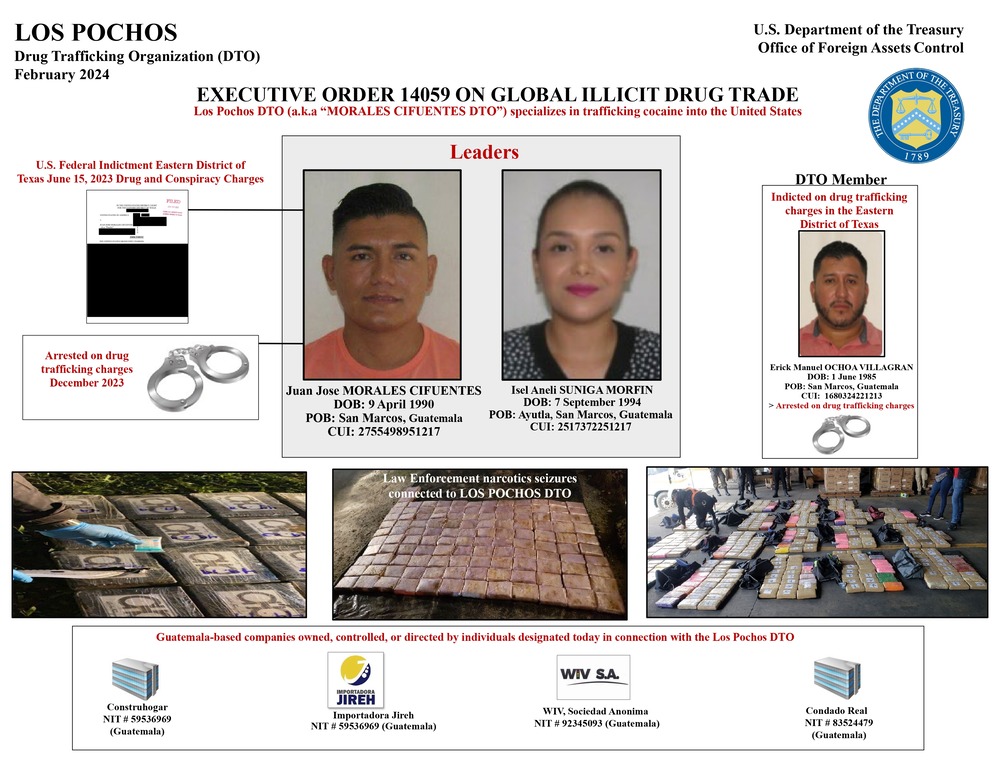The Los Pochos had been sanctioned in 2019 for involvement in activities or attempted activities that significantly contributed to the global spread of illegal drugs or their production, according to the U.S. Department of the Treasury’s Office of Foreign Assets Control (OFAC).
On Wednesday, OFAC said that designation was renewed “following a change in leadership and involvement of its members in local Guatemalan politics.”
OFAC indicated that Los Pochos provides substantial quantities of cocaine to various leaders of cocaine trafficking networks in Guatemala and Mexico.
Subsequently, these networks funnel the cocaine to leaders of the Sinaloa cartel, leveraging their established transportation networks to receive, consolidate, and distribute the drugs across U.S. markets.
Additionally, OFAC alleged that Los Pochos heavily relies on corrupt public officials, including members of the police, military, prosecutors, and other Guatemalan authorities, to facilitate its illicit trafficking operations.
In a targeted strike against their operations on Wednesday, OFAC singled out three key members and four affiliated companies operating from Guatemala.
The list encompasses Juan Jose Morales Cifuentes, Isel Aneli Suñiga Morfin, and Erick Manuel Ochoa Villagran, along with four entities owned or controlled by Los Pochos members: Importadora Jireh, a car dealership; Construhogar, a hardware store; WIV Sociedad Anonima, an industrial parking lot; and Condado Real, a real estate company.
OFAC has pinpointed Juan Jose Morales Cifuentes as a leader of Los Pochos since 2019, describing him as a Guatemala-based cocaine distributor and transportation coordinator linked with the Sinaloa Cartel. He is also the son-in-law of the deceased narcotics trafficker and former mayor, Erik Salvador Suñiga Rodriguez.
Cifuentes’s wife Isel Aneli Suñiga Morfin, Rodriguez’s eldest daughter and a contestant in the 2017 Guatemalan Miss Universe pageant, is suspected of being one of the Los Pochos leaders and among several associates based in Guatemala working for Morales Cifuentes and the Los Pochos.
Erick Manuel Ochoa Villagran, also based in Guatemala, is another narcotics trafficker involved with Morales Cifuentes and the Los Pochos, responsible for overseeing the storage of cocaine shipments, according to OFAC.
Under the sanctions, any property or interests in property held by the designated individuals and entities within the U.S. or controlled by U.S. persons must be frozen and reported to OFAC.
Furthermore, any entities owned, directly or indirectly, by one or more blocked persons to the extent of 50 percent or more are also subject to these sanctions.
The U.S. initially sanctioned Los Pochos in 2019 under the Kingpin Act, which targets narcotics traffickers. The group was implicated in trafficking cocaine from Guatemala, through Mexico, and into the U.S. It is purportedly linked to Mexico’s Sinaloa Cartel, recognized as one of the most infamous drug trafficking organizations globally.
“The Los Pochos, relying on a network of corrupt officials, has continued to facilitate the flow of illicit drugs from Guatemala into Mexico and the U.S.,” said Under Secretary of the Treasury for Terrorism and Financial Intelligence Brian E. Nelson.
He emphasized that the Treasury, working closely with its law enforcement partners, will persist in utilizing various tools to dismantle these facilitation networks and thwart the flow of deadly drugs.
This latest action, as affirmed by OFAC, is part of a comprehensive government strategy aimed at combating the global threat of illicit drug trafficking into the U.S., contributing to over 100,000 annual deaths of Americans and countless non-fatal overdoses.

